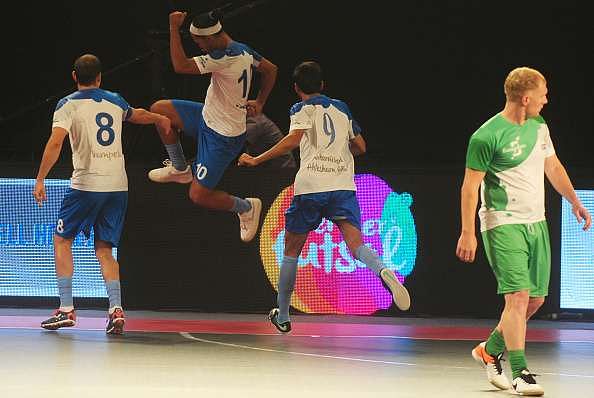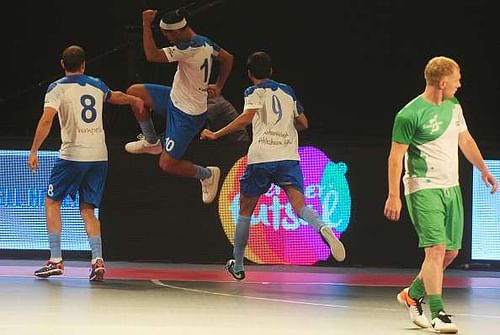
How players train differently for futsal and football

Premier Futsal League kicked off on Friday amidst much fanfare at the Jawaharlal Nehru Stadium in Chennai. The inaugural edition of the tournament consists of six teams divided into two groups with each side containing a marquee player, with the tournament being held in Chennai and Goa. The league was in the news for all the wrong reasons before as AIFF imposed sanctions on them and has stopped national players from competing in the much-hyped tournament, but it has started on a positive note and with a hope to start a new footballing culture in India.
The six marquee players are the legends of the game as the organisers have done a brilliant job to attract such huge names for the first edition of the league. Ronaldinho, the Brazilian maestro is at Goa while Real Madrid stalwart, Michel Salgado is the marquee signing for Kochi. Manchester United legends, Ryan Giggs and Paul Scholes are playing for Mumbai and Bengaluru respectively. Hernan Crespo is the captain of Kolkata whereas Alessandro 'Falcao' Viera, the man who is known as the Pele of Futsal is plying his trade at Chennai.
Luis Figo is the president of the league who recently was in the race to be the next FIFA president. Futsal originated in Uruguay and became a rage in South America and the rulebook of the game was compiled from a number of sports including football, basketball, water polo and handball. The term Futsal is a Spanish word which translates to 'room football' and now is a worldwide acclaimed sport which has a cult following and from 1982, World Championships are also being held for the game.
Each team in the Premier Futsal League consists of formal football players, futsal players, Indian youngsters and renowned freestylers from around the globe, most notably French free styler, Sean Garnier. Football and Futsal both have a lot of intricacies in them and it is not a case that a player who is great at football must be great in futsal too.
Along with natural abilities, football being an 11 man sport and played on a bigger field has fitness and stamina as one of the most important aspects of the game, whereas Futsal is based on technique and skills of an individual. Futsal being a shorter version of football is a lot faster than football and the players must be quick and also their vision should be faster than in football.
Flair, finesse and trickery are associated with not many players in football whereas in Futsal, these things form the core of the game as in short areas and in tight spaces, a Futsal player needs to get his way out of the crowded place in the blink of an eye. More time is afforded in football to dictate the game whereas first touches are the most important in futsal as the players don't get much time on the ball.
Football can be rough at times and might sometimes end in a boring draw but with Futsal, it is always an interesting contest and a breathtaking 40 minutes for the viewers. Futsal training is completely different when compared to the training involved with football as in the beautiful game the major emphasis is divided into various categories with defending and attacking drills being poles apart.
In Futsal, every player is technically astute and with the nature of the game being so fast, no individual can afford to just play at the back or stay forward and not track back. Vision plays a huge role in Futsal as the players cannot be one-dimensional and have to think of solutions constantly and cannot afford to sit back like the back line in football.
The most important aspect in futsal training is quick regrouping as the momentum changes pretty quickly in a five a side match. Tactical awareness is pretty important as the players have to move as a unit along with being ever ready to receive a pass from the other teammate. First touches play a decisive role as the players don't have more than a couple of seconds on the ball whereas, in football, the midfielders usually take their time and pump long balls or play a killer pass which can't be usually done in Futsal due to the fast nature of the game.
Players go through different regimes for the two sports but though football requires more fitness and ability to sustain pressure as it is the biggest sport in the world, whereas, in Futsal, the players need to be mentally sharp at all times and skills as well as exquisite first touches form the core of the exciting game, which is a new entity in India. The Premier Futsal League is like the 20-20 format of football and guarantees action-packed entertainment for the upcoming days. The viewers will embrace this sport and there is no doubt that Futsal will be a success in India – as it guarantees excitement at such a great speed which can be missed even at the blink of an eye.